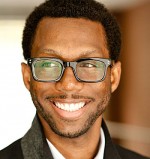Column Name
Title
Anthony Barfield (B.M. ’08, trombone) wanted to play drums when he got to sixth grade, but the band director had him try the trombone, and it was, he says, “love at first sight.” Barfield, who was born and raised in Collinsville, Miss., found that during middle school band rehearsals, he’d deviate from his part and play along with the trumpets, flutes, or saxophones, which sparked his interest in the inner workings of a composition. “I had no idea why I could play along with these other instruments just by hearing what they were playing,” he recalls, “but then one day my band directors told me I had perfect pitch,” and he started to write little melodies that he heard.
Body
Although he was interested in composing from that moment on, Anthony focused on performing, getting his bachelor’s at Juilliard and his master’s at the Manhattan School and continuing to perform until June 2012, at which point he decided to put down the trombone for good and focus on composition. “I was a very good trombonist, but I feel like it was the best decision of my life,” he says. In the meantime, Anthony had parlayed a work-study position filing papers in the Recording Department into a full-time job, which he balances with composing. In November, Chapter II, an album by the University of Alabama Wind Ensemble (“Roll Tide!”) and featuring his compositions came out. It’s available on iTunes or at anthonybarfield.com.
What do you do in the Recording Department?
Our office handles recording sessions, concerts, and recitals but also manages the majority of audio/video equipment around Juilliard. Although our department has four recording engineers who handle all projects, my specific job is to archive and master all concerts that have been recorded using Pro Tools.
Since this is the technology issue, tell us what role technology plays in your performing and writing—and how that role has changed.
As a composer I use programs such as Logic Pro X, Finale, and Maschine, which have opened possibilities for creativity that may not have been possible in the past. Logic Pro X is a software program for Mac and is great for Midi/synthesized sound as well as audio recording. I use it for film work as well as creating popular tracks, and I use Finale for notation. Maschine provides intuitive, tactile control for composing, sampling, slicing, performing, and more.
In your opinion, can/should technology shape music?
Absolutely. Technology has become such an integral part of our lives that it is necessary to incorporate it into any form of artistic creativity. The music industry has drastically changed because of technology, and it’s important that we use it to our advantage. There’s a lot of new hardware that could be a great addition to performance as well as extra tools for the composer.
What is the strangest or most memorable job you’ve ever had and what made it so?
The strangest job I’ve had by far was working in a grocery store gas station booth while in high school, in Philadelphia, Miss. The booth was literally the size of a Porta-Potty and there wasn’t much going on, so I brought in many books and CDs to pass the time. My interactions with customers were also often entertaining.
What job at Juilliard would you like to try out for a day and why?
I’d like to be a Music Tech faculty for a day. As a Juilliard student, I found this course to be very interesting and informative. In addition to what is already being taught, I would introduce more new and interesting software that could be used as extra tools for performance.
What’s the craziest day at work you’ve ever had?
A crazy day of work at Juilliard? Never! Actually most days in the Recording Department are jam-packed. That said, we have sort of become numb to what most people would think would be a crazy day.
If out of the blue your boss said to take the day off, what would you do with your free time?
Sleep late, work on commission deadlines, and go to the gym. I’d also try and fit in a trip to Levain Bakery for an oatmeal raisin cookie.
How do you balance your job and your artistic endeavors?
It takes quite a bit of planning. I work on compositions while on breaks at Juilliard and continue when I get home from work. New ideas come to me throughout the day, so I carry my notebook to jot them down. This makes it a little easier to “write” when I’m not able to be at my composition desk. My vacation days are spent traveling to premiere performances or being in residence at music schools.
What other pursuits are you passionate about?
My girlfriend and I are foodies and we like finding new and interesting restaurants. I also love being physically active—riding my bike and going to the gym.
What are you reading or watching these days?
I’m reading (again) Napoleon Hill’s Think and Grow Rich, which suggests techniques for becoming successful as inspired by Andrew Carnegie. I also watched Breaking Bad until it ended.
What might people be surprised to know about you?
That I grew up on a 1,000-plus acre farm in Mississippi. I tended to the cows, hauled hay, built fences, went deer huntin’ and all of that. Believe it or not, my parents still live on a dirt road. The crops included beans, greens, corn, peas, and watermelon, and we had to physically pick all of the crops and shell the ones that needed to be shelled. It was a lot of hard work but yet a somewhat easy and simple lifestyle. Another thing that might surprise people? Most kids learned to drive with a car; I learned on our tractor.





